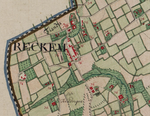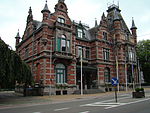Parc Arboretum du Manoir aux Loups
Arboreta in FranceFrench garden stubsGardens in Nord (French department)Nord (French department) geography stubs

The Parc Arboretum du Manoir aux Loups (5 hectares) is a private arboretum located at 300 Route de Neuville, Halluin, Nord, Nord-Pas-de-Calais, France. It is open in spring and fall plus summer Saturdays; an admission fee is charged.
Excerpt from the Wikipedia article Parc Arboretum du Manoir aux Loups (License: CC BY-SA 3.0, Authors, Images).Parc Arboretum du Manoir aux Loups
Route de Neuville, Lille
Geographical coordinates (GPS) Address Nearby Places Show on map
Geographical coordinates (GPS)
| Latitude | Longitude |
|---|---|
| N 50.7624 ° | E 3.1442 ° |
Address
Route de Neuville
Route de Neuville
59250 Lille
Hauts-de-France, France
Open on Google Maps








